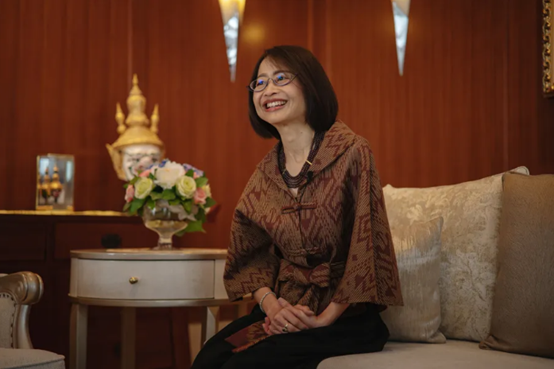Thai consul general: Embracing ties between China, Thailand

Prinat Apirat, consul general of Thailand in Shanghai. [Photo/Shanghai Observer]
"When I first visited Shanghai in 2004, I could see the city's rapid development," says Prinat Apirat, now the 10th consul general of Thailand in Shanghai.
Reflecting on two decades of change, she also feels the deepened bond between the two countries.
"Thailand and China share over a thousand years of friendship," said Apirat. Their historical ties date back to the Ming Dynasty (1368-1644), when Admiral Zheng He's fleet brought Chinese silk and porcelain to Thailand. Chinese immigrants introduced new cooking techniques, transforming Thai cuisine to include elements from Cantonese and Fujian culture. Even today, many Thai people celebrate the Dragon Boat Festival by eating zongzi (sticky rice dumplings).
Apirat, who often explores Shanghai's culinary offerings with her 84-year-old mother, has embraced China's digital conveniences like WeChat, Alipay, Didi, and Taobao. "In Thailand, I carried a large briefcase to work. Here, my phone is my briefcase," she says, highlighting her adaptation to Shanghai's digital lifestyle.
The proximity of parks to the consulate allows Apirat and her mother to enjoy walks and observe the city's vibrant community life. The concept of 15-minute living circles, she notes, exemplifies the city's commitment to enhancing residents' happiness.
Apirat has also interacted with over 1,000 Thai youths currently in Shanghai, mainly students. She appreciates their interest in Chinese culture and language and has thanked the Shanghai government for its support. She believes these bilingual talents will become vital in fostering long-term cooperation between China and Thailand.
Having worked in Thailand's Ministry of Foreign Affairs Office, in the international economic affairs department, Apirat has long focused on China. As Thailand's top trading partner and largest source of foreign investment, China plays a crucial role in Thailand's economic landscape.
Apirat recounts how the Chia Tai Group, led by Dhanin Chearavanont, was the first foreign enterprise to invest in China after the implementation of its reform and opening-up policies. The group's influence is still felt in Shanghai, where landmarks like the Bualuang Bank and Super Brand Mall stand testament to enduring economic ties.
More Thai businesses are now investing in Shanghai, including major companies like the Petroleum Authority of Thailand, Kasikorn Bank, Siam Cement Group, Mistine Cosmetics, and various Thai restaurants. Apirat praises Shanghai's business-friendly environment, which attracts both large and small Thai enterprises.
Conversely, Shanghai companies are making inroads into Thailand. Notably, SAIC Motor's joint venture with Chia Tai Group has turned Thailand into a manufacturing hub for MG cars in Southeast Asia. Apirat highlights Thailand's comprehensive incentives for electric vehicle investments, emphasizing the country's goal of achieving 30 percent zero-emission vehicle production by 2030.
Thailand remains a favored destination for Shanghai tourists. The visa exemption between China and Thailand came into effect on March 1, and Thailand recently extended the visa-free stay for Chinese citizens to 60 days. Addressing safety concerns, Apirat assures that Thailand is a safe destination, encouraging tourists to verify information and seek assistance from Thai authorities when needed.
"Thailand is and always will be the Land of Smiles," Apirat concludes, inviting more Chinese tourists to experience her country's warmth and hospitality.
Source: Shanghai Observer